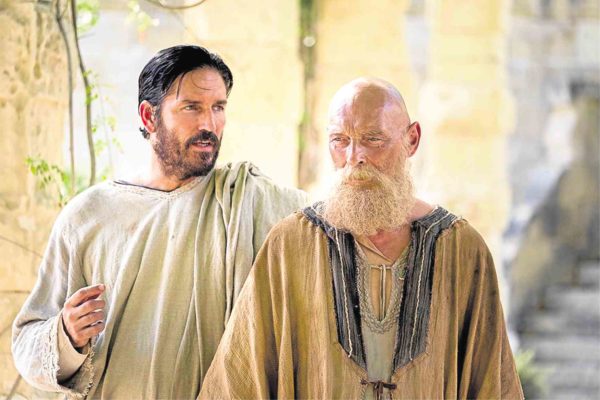Jim Caviezel wears his heart—and religion—on his sleeve. This we found out when we interviewed the handsome actor some years ago. His answers to our questions seemed measured, but he nevertheless expressed strong opinions about issues he felt passionate about—like spirituality and belief in a Higher Being.
Our faith in the Lord, he stressed, isn’t something we should be ashamed about: “Many people find it difficult to talk about things that are religious, but I don’t. Throughout history, religion has had a big influence on politics and the arts, so I find it ridiculous to push it aside.
“A great man once said that democracy cannot be sustained without a shared commitment to certain moral truths, and it comes with a huge responsibility.
“The basic question to ask is this: Can society exclude moral truths and reasoning? We cannot just conform to what comes easily—we have to handle issues concerning religion and morality like grownups.”
Jim, who portrayed Jesus Christ in Mel Gibson’s gory religious epic “The Passion of the Christ,” is just as, well, passionate in his characterization as Luke the Evangelist in Andrew Hyatt’s newly minted religious drama, “Paul, Apostle of Christ,” where James Faulkner is cast in the title role.
Together, Luke and Paul mull over the significance of suffering in the name of faith: If God loves us, why does He let us suffer?
Luke, the Greek physician who’s known to have written the second-longest canonical Gospel of the New Testament, risks his life when he visits the ruthless Christian persecutor-turned-devout apostle in prison as he awaits imminent doom at the hands of Emperor Nero—
who wants to rid Rome of Christian converts!
But, even in the face of death, Paul preaches the Good News of salvation by way of his actions, like when he crosses paths with Mauritius (Olivier Martinez), the prefect of Mamertine Prison, where he’s incarcerated.
Before his conversion to Christianity, Paul, considered a pivotal figure in the formation of the early Catholic Church, went through a drastic change of heart after his miraculous “run-in” with the resurrected Christ on a trip from Jerusalem to Damascus.
Even on paper, the events that led to the formation of the Roman Catholic Church, the largest Christian church with more than 1.29 billion members worldwide, are as dynamic as the teachings that inspired them.
But the film, despite the actors’ earnest performances and relevant themes (about forgiveness, etc.), is weighed down by its characters’ gratingly ponderous proselytizing and glacially paced narrative progression.
If you want to “evangelize” to young kids, this snooze-inducing drama isn’t the best way to go about it.
Revisionist tale
With its more familiar but provocatively revisionist tale, Garth Davis’ “Mary Magdalene” does better—but just barely.
Be that as it may, the themes the movie examines make up for the bland and soporific sequences framing them.
It isn’t as deeply polarizing as Martin Scorsese’s “The Last Temptation of Christ,” but it introduces edgy issues that make the production a compelling conversation piece—and a cause célèbre for feminists to rally behind!
To focus on Magdalene’s “reinvigorated” story, the movie depicts crucial events in Christ’s salvific mission as bullet-point moments that are merely used as means to an end.
The film further attempts to rectify the misconception that Mary of Magdala was the repentant prostitute she’s been “misleadingly” described in many religious and Biblical stories.
Reportedly, the decline of her reputation as an “apostle” began shortly after her death, especially after Pope Gregory the Great declared her a “sinful woman” in a homily in 591 AD.
In fact, being the first witness of Jesus’ resurrection—as all four Gospel writers agree—
Mary Magdalene should be celebrated as the faithful first bearer of God’s Good News!
While this brand-new iteration of the Greatest Story Ever Told benefits from the appropriate casting of the luminously lovely Rooney Mara as the woman who stubbornly traveled with Jesus, it isn’t an easy sell.
Part of the problem lies in the fact that Magdalene is hardly seen interacting with the 12 disciples: Peter, Andrew, James the Great, John, Philip, Jude, Bartholomew, Thomas, James, Matthew, Simon the Zealot and Judas Iscariot.
At a time when women’s lives aren’t considered their own, she defied the odds to prove that their voices are just as significant as their male counterparts in a genuinely God-fearing world.
The film treats Magdalene as a feminist figure largely considered the 13th apostle who breached conventional norms to follow what her faith dictated. Even if Peter (Chiwetel Ejiofor) didn’t want her around because her presence sometimes resulted in “divisiveness,” her loyalty and persistence won Jesus over.
Interestingly, she found an unlikely ally in Judas (Tahar Rahim), who as we all know had his own demons to exorcise.
Another source of enthusiastic discussion is the unconventional casting of Joaquin Phoenix. He’s no slouch at acting, that’s for sure—but, despite his best effort, it’s hard to suspend disbelief that the 43-year-old is the charismatic Son of God. He’s more bohemian than blessed.
